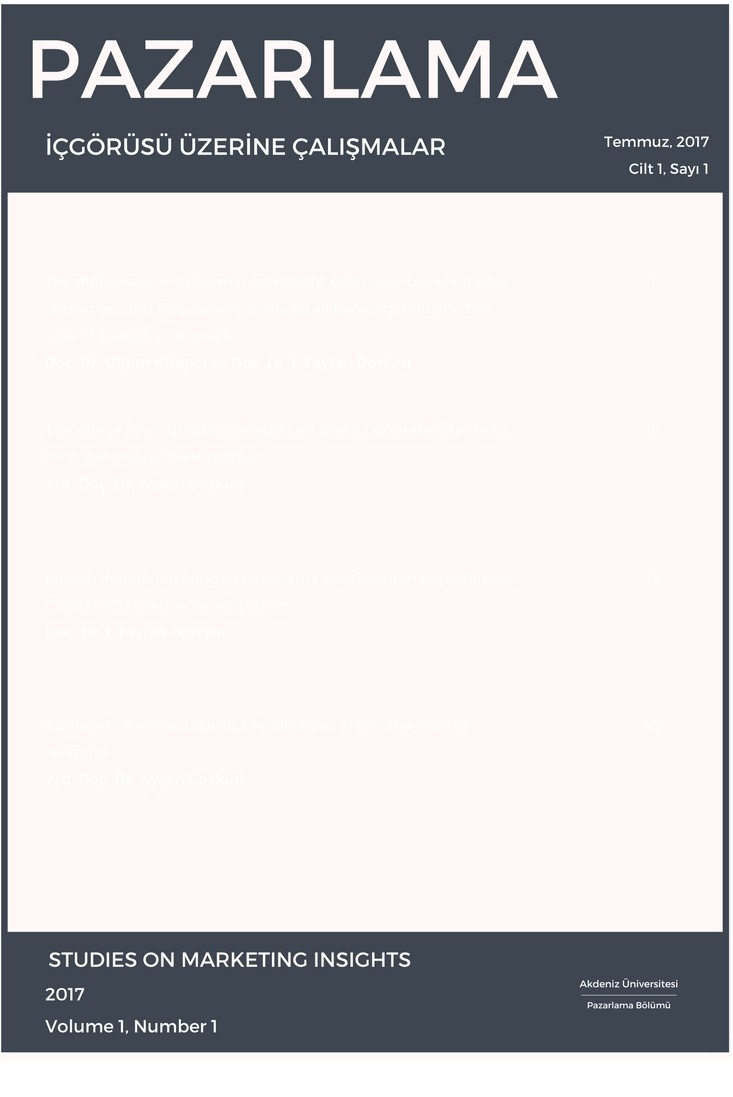Cebimizdeki Değerli Çöp – Cep Telefonu Atıklarında Genişletilmiş Üretici Sorumluluğu
Elektronik atık, Cep telefonu, Genişletilmiş üretici sorumluluğu, İçerik analizi
The Valuable Rubbish in Our Pockets – Extended Producer Responsibility in Mobile Phone Wastes
___
- Atık Elektrikli ve Elektronik Eşyaların Kontrolü Yönetmeliği (22 Mayıs 2012), Resmi Gazete (Sayı:28300).
- Balde, C. P., Forti, V., Gray, V., Kuehr, R. ve Stegmann, P. (2017), The Global E-waste Monitor 2017. Bonn, Geneva, Vienna: United Nations University, International Telecommunication Union & International Solid Waste Association.
- Basel Convention (2011), Mobile Phone Partnership Initiative (MPPI) (http://www.basel.int/Implementation/TechnicalAssistance/Partnerships/MPPI/Overview/tabid/3268/Default.aspx adresinden erişildi).
- Bovea, M. D., Ibáñez-Forés, V., Pérez-Belis, V.,ve Juan, P. (2018), “A survey on consumers’ attitude towards storing and end of life strategies of small information and communication technology devices in Spain”, Waste Management, 71, 589–602.
- Choksi, S. (2001), “The Basel Convention on the control of transboundary movements of hazardous wastes and their disposal: 1999 Protocol on liability and compensation”, Ecology Law Quarterly, 28(2), 509–539.
- Darby, L. ve Obara, L. (2005), “Household recycling behaviour and attitudes towards the disposal of small electrical and electronic equipment”, Resources, Conservation and Recycling, 44(1), 17–35.
- ERRC (2018), Map of States With Legislation (https://www.ecycleclearinghouse.org/contentpage.aspx?pageid=10 adresinden erişildi).
- Gallo, D. T. (2013). Broad Overview of E-Waste Management Policies in the U.S. Global E Waste Management (GEM) Network Workshop. Philadelphia. (https://www.epa.gov/sites/production/files/2014-05/documents/overview.pdf adresinden erişildi).
- Geeraerts, K., Illes, A. ve Schweizer, J.-P. (2015), “Illegal shipment of e-waste from the EU: A case study on illegal e-waste export from the EU to China. A study compiled as part of the EFFACE project, London: IEEP. (https://efface.eu/sites/default/files/EFFACE_Illegal%20shipment%20of%20e%20waste%20from%20the%20EU.pdf adresinden erişildi).
- Gehrke, D. ve Turban, E. (1999), “Determinants of successful website design: Relative importance and recommendations for effectiveness”, Proceedings of the 32nd Annual Hawaii International Conference on Systems Sciences, 32(c), 1–8.
- Heacock, M., Kelly, C. B., Asante, K. A., Birnbaum, L. S., Bergman, Å. L., Bruné, M. N., … Suk, W. A. (2016), “E-waste and harm to vulnerable populations: A growing global problem”, Environmental Health Perspectives, 124(5), 550–555.
- Huisman, J., Magalini, F., Kuehr, R., Maurer, C., Ogilvie, S., Poll, J., Delgado, C., Artim,E., Szlezak, J., Stevels, A., (2008), 2008 Review of Directive 2002/96 on WasteElectrical and Electronic Equipment. United Nations University, Bonn, Germany.
- Ikhlayel, M. (2018), “An integrated approach to establish e-waste management systems for developing countries”, Journal of Cleaner Production, 170, 119–130.
- ITU (2017), Global E-waste Status and Trends, (https://www.itu.int/en/ITU-D/Climate-Change/Documents/GEM%202017/Global-E-waste%20Monitor%202017%20-%20Chapter%206.pdf adresinden erişildi).
- Khetriwal, D. S., Kraeuchi, P. ve Widmer, R. (2009), “Producer responsibility for e-waste management: Key issues for consideration - Learning from the Swiss experience”, Journal of Environmental Management, 90(1), 153–165.
- Klenovšek, A. ve Meško, G. (2011), “International waste trafficking: Preliminary explorations”, Understanding and Managing Threats to the Environment in South Eastern Europe içinde (s. 79–99). Dordrecht: Springer.
- Nnorom, I. C., Ohakwe, J. ve Osibanjo, O. (2009), “Survey of willingness of residents to participate in electronic waste recycling in Nigeria - A case study of mobile phone recycling”, Journal of Cleaner Production, 17, 1629–1637.
- OECD (2016), Extended Producer Responsibility: Updated Guidance for Efficient Waste Management, OECD Publishing, Paris, http://dx.doi.org/10.1787/9789264256385-en.
- Ongondo, F. O. ve Williams, I. D. (2011), “Greening academia: Use and disposal of mobile phones among university students”, Waste Management, 31, 1617–1634.
- Öztürk, T. (2015), “Generation and management of electrical-electronic waste (e-waste) in Turkey”, Journal of Material Cycles and Waste Management, Vol.13, No.3, 411-421.
- Premalatha, M., Tabassum-Abbasi, Abbasi, T. ve Abbasi, S. A. (2014), “The generation, impact, and management of e-waste: State of the art”, Critical Reviews in Environmental Science and Technology, 44(14), 1577–1678.
- Robinson, B. H. (2009), “E-waste: An assessment of global production and environmental impacts”, Science of the Total Environment, 408(2), 183–191.
- Statista (2018), “Number of mobile phone users worldwide from 2015 to 2020 (in billions), (1 Haziran 2018 tarihinde https://www.statista.com/statistics/274774/forecast-of-mobile-phone-users-worldwide/ adresinden erişildi).
- Swico Recycling (2018), “Questions&Answers”, (15 Haziran 2018 tarihinde http://www.swicorecycling.ch/en/disposal/faq adresinden erişildi).
- The Brand Age (2016), “2,5 yılda bir telefon değiştiriyoruz”, Haziran, s.73.
- TÜİK (2016), Hanehalkı Bilişim Teknolojileri Kullanım Araştırması, (www.tuik.gov.tr/PdfGetir.do?id=21779 adresinden erişildi).
- UNEMG. (2017), United Nations System-wide Response to Tackling E-waste, (https://unemg.org/images/emgdocs/ewaste/E-Waste-EMG-FINAL.pdf adresinden erişildi).
- UNEP (2008), Bali Declaration on Waste Management for Human Health and Livelihood. (http://www.basel.int/Portals/4/Basel%20Convention/docs/meetings/cop/cop9/bali-declaration/BaliDeclaration.pdf adresinden erişildi).
- Warren, C., Barsky, A., Mcgraw, A. P. ve MacInnis, D. (2018), “Humor, comedy, and consumer behavior”, Journal of Consumer Research, https://doi.org/10.1093/jcr/ucy015.
- Ylä-Mella, J., Keiski, R. L. ve Pongrácz, E. (2015), “Electronic waste recovery in Finland: Consumers’ perceptions towards recycling and re-use of mobile phones”, Waste Management, 45(2015), 374–384.
- Başlangıç: 2017
- Yayıncı: Olgun KİTAPCI
Tüketici Etiği Açısından Showrooming Mağaza İstismarı Olarak Tanımlanabilir mi?
Yeşil Pazarlama Çerçevesinde Tutum-Davranış Uyuşmazlığına Akli Hareket Kuramı İle Yaklaşım
Öğrencilerin Mobil Kozalanma (Mobile Cocooning) Davranışlarının Analizi: İzmir Örneği
Aykan CANDEMİR, Ali Erhan ZALLUHOĞLU, Aslı DİYADİN, Cihat KARSLI
Cebimizdeki Değerli Çöp – Cep Telefonu Atıklarında Genişletilmiş Üretici Sorumluluğu
